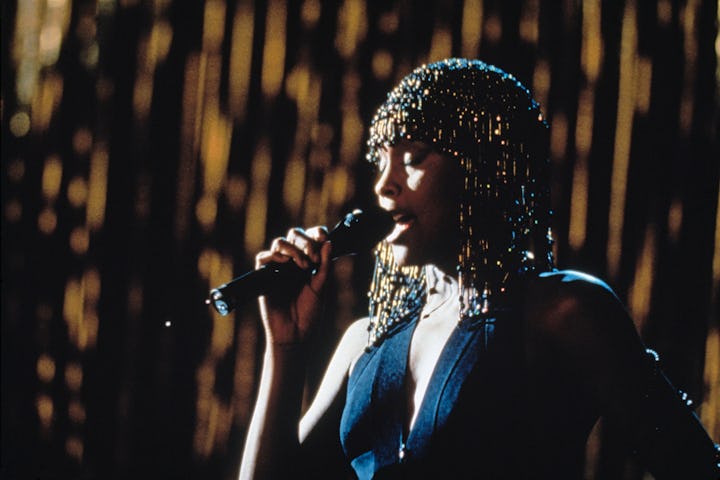31 Years Ago, One Soundtrack Album Totally Redefined A Country Classic
The Bodyguard made Whitney Houston into a legend.

When it comes to major motion picture soundtracks, The Bodyguard soundtrack stands alone as the genre's commercial queen. Having sold over 45 million copies since its release 31 years ago on November 17, 1992, it's unlikely ever to slide down the sales chart. And adding to the album’s legacy is its role in vaulting Whitney Houston into the highest echelon of female singers.
To be clear, Whitney Houston was a household name before co-starring alongside Kevin Costner in The Bodyguard and doing all of the heavy lifting for the film’s soundtrack. Her 1991 performance of the Star Spangled Banner in 1991 before Super Bowl XXV is considered one of the most memorable ever, with her powerhouse vocals meeting the moment as the biggest sporting event in the country took place against the backdrop of the US military intervention in the Persian Gulf.
But while that Star Spangled Banner performance made people feel some kind of way, it was The Bodyguard soundtrack that spurred them to action. Specifically, to march down to their local record store in droves to buy an album that was, in effect, a Whitney Houston EP with another handful of songs from the film added on for good measure.
Of the six Houston songs on the album, only “Jesus Loves Me” failed to garner release as a single. Houston’s cover of Dolly Parton’s “I Will Always Love You” got things rolling as the lead single, spending 14 weeks at number one on the Billboard Hot 100 singles chart and winning a Grammy for Record of the Year.
Whitney Houston at the 1992 American Music Awards.
Houston’s version deviated from Parton’s original by cranking up the power on the ballad and including key changes and extemporaneous flourishes on the song’s back stretch that showcased the full scope and force of Houston’s voice. In a 2021 appearance on Watch What Happens Live with Andy Cohen, Parton shared that she still wishes she could've performed the song with Houston before she passed away in 2012.
"I was never asked to perform that with Whitney. I wish that could have happened. I would've loved that but I don't think I could've come up to [sing] with her, though — she would've outsung me on that one for sure," she said in the interview.
The legacy of the song continues to live on today, as Parton also shared that she used a significant portion of the $10 million in royalties she’s made from the song to make a meaningful and strategic investment in Nashville.
“I bought a property down in what was the Black area of town, and it was mostly just Black families and people that lived around there,” Parton said in the same interview, according to HuffPost. "And I thought, ‘This is the perfect place for me to be,' considering it was Whitney. I thought this is great — I'm just gonna be down here with her people, who are my people as well. So, I just love the fact that I spent that money on a complex and I think, ‘This is the house that Whitney built.'"
But “I Will Always Love You” wasn’t the only significant single from The Bodyguard soundtrack. “I’m Every Woman” and “I Have Nothing” also went platinum, with the latter picking up a nomination for Best Original Song at the 65th Annual Academy Awards.
Though Kenny G., Curtis Stigers, and Aaron Neville all have tracks on The Bodyguard soundtrack, it’s still largely considered a Whitney Houston album. As such, it is credited as the best-selling album by a woman in music history, in addition to its accomplishments as the best-selling album of the decade and the first album to sell over a million copies in a single week.
The Bodyguard soundtrack can also arguably be credited with helping the film maintain a stronger legacy than initially anticipated. Critics widely panned The Bodyguard, as is still reflected in its 38% Rotten Tomatoes rating. But the film cashed in at the global box office to the tune of $411 million, maintains a strong following to this day, and was listed as one of the 100 Most Enjoyable Bad Movies Ever Made in The Official Razzie Movie Guide. This is the power of great music. A objectively bad, or at the very least, embarrassing, movie still holds a fond place in our hearts because of the excellence of the soundtrack album. We didn’t need to see The Bodyguard at all. When we heard Houston sing, that was enough. And over three decades later, the only thing we wish we could change is to listen to her sing it again.